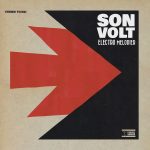Jay Farrar’s voice hits like raw coffee on an empty stomach. It cuts into things — the night usually — with plain force and unkind certainty. He does not write songs to put you at your ease, and if perchance they inspire in the listener an impulse to harmonize, that can only be because you, too, are driving through sparse headlights drumming on the steering wheel.
Straightaways, then, offers ten new, spare, simple songs. They are presented with a minimum of fuss, as unvarnished at Farrar’s voice, and as unaffected.
Unaffected by all that’s gone on since he quietly and without evident fanfare released Trace, unaffected by the subsequent accolades, unaffected by real or imagined competition with his former collaborator, unaffected by whatever kind of pigeonhole this magazine (and others) might unintentionally have created for a real or imagined subgenre of popular music.
Indeed, the surprise is how utterly unchanged Straightaways finds Farrar. His seems to be a singular and internal kind of rootless restlessness (I am reminded somehow of Maugham’s The Razor’s Edge), and one begins to suspect that he will or could produce several handfuls of records that will all be close kin over the next few decades.
That Farrar continues to invite a three-piece band (still drummer Mike Heidorn and the brothers Boquist; Brian Paulson produces again) to accompany these songs speaks of infinite trust, so great is the intimacy with which he approaches the microphone in the sanctity of the studio. He relationship to the words is quite naturally different, and less revealing, on tour.
Revealing is a relative matter with Farrar, of course. Many popular artists seek desperately to reveal themselves, or a fervently imagined vision thereof, through their work. Not him. In interviews he speaks in simple, tight phrases, almost haiku; he’s not intentionally unhelpful, but long years seem to have accustomed Farrar to reducing thoughts to hard nuggets. One wonders, indeed, what impulse leads him to sharing his songs, and whether one day he will withdraw, Glen Gould-like.
At any rate, one begins with Farrar’s voice because it is inevitably the sound of things that settles into the stomach first, and then — maybe — the words. Certainly it was the sound of Farrar’s voice, his unmistakably road-weary tone of dawn-hunting solitude, grease, smoke, and neon that made Trace an arresting debut.
Two years of traveling and playing together have made Son Volt an even more complementary ensemble to that compositional and singing voice. The musicians fit together like an old married couple, and as wisely leave plenty of space. They play with more certainty, with trust. And Straightaways is, as the printed explanation handed to early listeners suggests (Farrar is everywhere a man of few and well-chosen words), a continuation of Trace.
The rest is mostly commerce.
Accustomed now to the sound and sensibility of Farrar’s voice, Straightaways is less striking than its predecessor. The shock is gone, the rawness now familiar. It does not often approach the ebullient blues of Son Volt’s Del Reeves cover from Rig Rock Deluxe, “Lookin’ at the World Through a Windshield”. (And one wonders, though it’s hard to hear in the song, if “No More Parades” is meant for an homage to the Phil Ochs song of the same name.) No chorus seems so immediately captivating as Trace’s opening “Windfall”, though “Creosote” has much the same flavor. “Been Set Free”, a kind of murder ballad (“My life’s been a burden/And I’m going home”) is stunning and sad.
Stunning and sad, well, there’s a lot of that. So much so that the concluding “Way Down Watson” seems almost the coda to a song cycle.
That is, Straightaways seems on first blush unlikely to attract the attention of radio. (But, then, it was a surprise to hear traces of Trace over the airwaves…) Because its ambitions are less transparent, and its approach so spartan, one immediately expects a critical backlash.
Yeah, well, whatever.
The last words here belong to Mr. Farrar. They’re as close to the center of Straightaways as I can find. For the rest, you will be well rewarded by your own investigation into the matter.
“Born under widespread changes
The search for higher reason
Learning the ropes okay
Fate just runs you around.”
— “Creosote”




